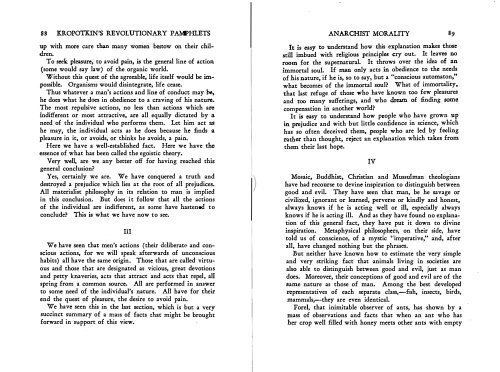Kropotkin's Revolutionary Pamphlets - Libcom
Kropotkin's Revolutionary Pamphlets - Libcom
Kropotkin's Revolutionary Pamphlets - Libcom
Create successful ePaper yourself
Turn your PDF publications into a flip-book with our unique Google optimized e-Paper software.
as<br />
KROPOTKIN'S REVOLUTIONARY PAMPHLETS<br />
ANARCHIST MORALITY<br />
up with more care than many women bestow on their children.<br />
To seek pleasure, to avoid pain, is the general line of action<br />
(some would say law) of the organic world.<br />
Without this quest of the agreeable, life itself would be impossible.<br />
Organisms would disintegrate, life cease.<br />
Thus whatever a man's actions and line of conduct may be,<br />
he does what he does in obedience to a craving of his nature.<br />
The most repulsive actions, no less than actions which are<br />
indifferent or most attractive, are all equally dictated by a.<br />
need of the individual who performs them. Let him act as<br />
he may, the individual aCts as he does because he :finds a.<br />
pleasure in it, or avoids, or thinks he avoids, a pain.<br />
Here we have a well-established fact. Here we have the<br />
essence of whit has been called the egoistic theory.<br />
Very well, are we any better off for having reached this<br />
general conclusion?<br />
Yes, certainly we are. We have conquered a truth and<br />
destroyed a prejudice wich lies at the root of all prejudices.<br />
All materialist philosophy in its relation to man is implied<br />
in this conclusion. But does it follow that all the actions<br />
of the individual are indifferent, as some have hastened to<br />
conclude? This is what we have now to see.<br />
III<br />
We have seen that men's actions (their deliberate and conscious<br />
actions, for we will speak afterwards of unconscious<br />
habits) all have the same origin. Those that are called virtuous<br />
and those that are designated as vicious, great devotions<br />
and petty knaveries, acts that attract and acts that repel, all<br />
spring from a common source. All are performed in answer<br />
to some need of the individual's nature. All have for their<br />
end the quest of pleasure, the desire to avoid pain.<br />
We have seen this in the last section, which is but a very<br />
succinct summary of a mass of facts that might be brought<br />
forward in support of this view.<br />
)<br />
It is easy to understand how this explanation makes those<br />
still imbued with religious principles cry out. It leaves no<br />
room for the supernatural. It throws over the idea of an<br />
immortal soul.<br />
If man only acts in obedience to the needs<br />
of his nature, if he is, so to say, but a "conscious automaton:'<br />
what becomes of the immortal soul? What of immortality,<br />
that last refuge of those who have known too few pleasures<br />
and too many sufferings. and who dream. of :finding some<br />
compensation in another world?<br />
It is easy to understand how people who have grown up<br />
in prejudice and with but little confidence in science, which<br />
has so often deceived them, people who are led by feeling<br />
rather than thought. reject an explanation which takes from<br />
them their last hope.<br />
IV<br />
Mosaic, Buddhist, Christian and Mussulman theologians<br />
have had recourse to devine inspiration to distinguish between<br />
good and evil. They have seen that man, be he savage or<br />
civilized, ignorant or learned, perverse or kindly and honest,<br />
always knows if he is acting well or ill, especially always<br />
knows if he is acting ill. And as they have found no explanation<br />
of this general fact, they have put it down to divine<br />
inspiration. Metaphysical philosophers, on their side, have<br />
told us of conscience, of a mystic "imperative:" and, after<br />
all, have changed nothing but the phrases.<br />
But neither have known how to estimate the very simple<br />
and very striking fact that animals living in societies are<br />
also able to distinguish between good and evil, just as man<br />
does. Moreover, their conceptions of good and evil are of the<br />
same nature as those of man. Among the best developed<br />
representatives of each separate dass,-fish, insects, birds,<br />
mammals,-they are even identical.<br />
Foret, that inimitable observer of ants, has shown by a<br />
mass of observations and facts that when an ant who has<br />
her crop well filled with honey meets other ants with empty

















